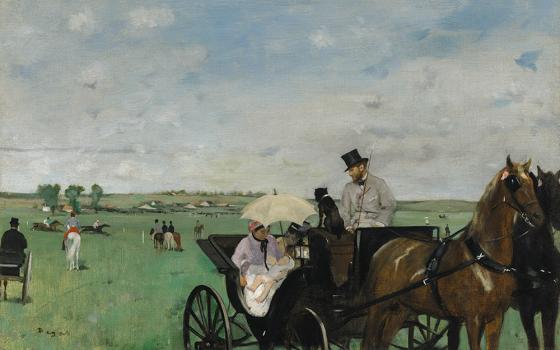As much as I’ve recently voiced skepticism over the bishops’ new “religious liberty” initiative, I also think colleague Michael Sean Winters has put it as plainly as possible that the Obama administration has a significant choice to make, and if it goes the wrong way it could be costly in the Catholic world.
By way of the new and vaunted “religious liberty” effort, I think it is a thinly disguised – and potentially very costly in multiple ways -- effort to reclaim the credibility that has profusely leaked in recent decades from the episcopal culture. The point to be made in that instance is that the bishops are receiving a great deal of the pushback from Catholic politicians and the Catholic public. The problem is that the bishops have not made a persuasive case in the sex and gender issues they find most disturbing. And while they may point to relativism, secularism, a hyper-sexed society and whatever other ills they perceive lurking about, the fact o f the matter is they have mostly themselves to blame for their decreased standing in the general culture.
But that is not to say that the bishops don’t have a strong case to make in the matter of expanding conscience rights in the new health care regulations. “Expanding conscience rights” is probably an unfortunate phrase, because the expansion is, in reality, a maintenance of the status quo of exceptions to certain coverage that currently exist for Catholic institutions.
I’ve also reported in these pages and for t he print issue on what has happened in Illinois, where a rigid state approach to new legislation permitting civil unions has resulted in the state rescinding its contracts to Catholic adoption agencies who refuse to provide adoptions to unmarried, including gay, couples. I think the church is wrong to deny adoptions to gay couples, but in the past such requests were accommodated by referrals to other agencies. Now those agencies and a few new ones get all the referrals. The losers are the people of Illinois who are deprived o f the church’s sense of mission which undergirded the work of agencies that, in the highly regarded and measured world of Illinois social services, were always ranked at or near the top in performance.
As much as Catholic officialdom’s surprise and dismay was a naïve reaction to political reality when federal contracts with church agencies dealing with immigration were not renewed, it is just as politically remarkable t hat there should be a debate about granting Catholic institutions exception to having to provide contraceptive and other services out of step with church teaching.
Any Catholic representative or senator who voted for health care will tell you that it was religious women and the progressive Catholic community that provided the cover for that vote. And that cover was only possible because of years of work in building up relationships and nurturing individuals and groups who could articulate a case for religious involvement in politics that was not an echo of the narrower view of the religious right.
A lot of people risked a great deal to get health care passed. If the administration wheels on the Catholic community this close to that fact and issues an untenable ultimatum to Catholic institutions, a lot of political work and good will will be undone in an instant.




